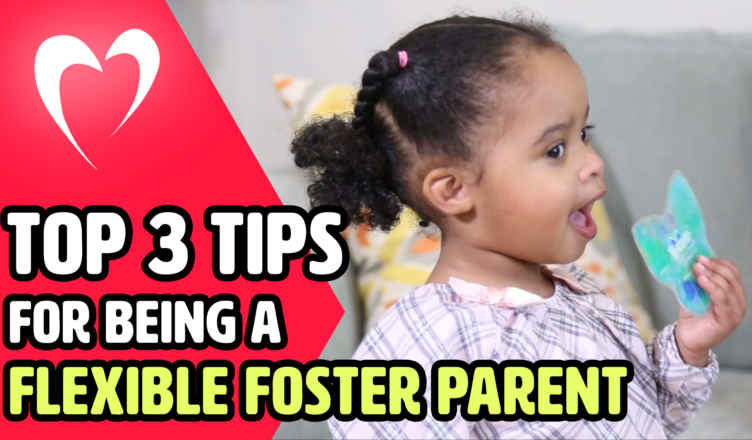If anyone knows about the ups and downs of fostering, it’s Brian Blythe and John Kristiansen. Adoptive fathers to four little girls, these men have learned a few lessons on their way to Adoption Day. We recently caught up with them to learn about their transition from ordinary joes to foster care superheroes. After meeting their charming, energetic family, we realized that they had internalized a lesson that every foster parent could use in their daily lives: flexibility.
“Did you ever imagine you’d have four kids?” we asked John. “Oh no way. I was definitely a one-kid kinda guy.” It was one of the last questions we would ask him that day, but his answer surprised us – how could someone who seems to be so parental and nurturing, who took in four young girls, have come from a place where he only wanted one child? When did it change?
“I think it was when we met her,” Brian, John’s partner, said. Selena is the oldest of their daughters and was their first adoption. Within a few years after her arrival in their household, the family would gain three more daughters – Vanessa, Aalimah and Gia. The journey, however, would not be easy, and both Brian and John would find themselves in one of the most difficult situations they had ever faced.
In the video above, you can hear the pair describe their foster care origin story, with all its ups and downs. Now, with their trials and tribulations behind them, Brian and John can offer some words of wisdom for those who are on their own foster care journey. Below, we’ve picked out some of the best bits of foster care wisdom that the couple shared with us:
1) Don’t try to control everything.
“If you’re a control freak, learn not to be,” Brian said, distilling some advice from the counselor who’d helped him and John come to terms with their foster care-related stress. “If you’re going through a particularly hard time, definitely look for counseling that’s provided,” he added. “Reach out to the community, other foster parents.”
When you foster, you’ve got paperwork, meetings, caseworkers, bio family and a variety of other people and events that can make your role complicated. “It’s an unconventional parenting situation. There’s a lot of people involved, but the only one that matters is the kid,” John said.
To help you cope, Brian and John both recommend counseling – it was a service provided to them that they mentioned over and over again in our interview. This job isn’t easy, but if you want the kids to have the brightest possible future, you’ve got to make sure you can handle your own stress in a way that is productive. And if all this talk of stress and a lack of control is scaring you, John has some words to reassure you that, after all is said and done, it’s worth it:
“It is such an amazing experience, it’s such an emotional experience,” John said. “My life is different now than I ever thought it would be when I was 30 – much happier, much more based in purpose.”
2) Don’t speculate!
“It’s really important not to speculate about the case, don’t speculate about the birth parents,” Brian said. “It’ll get into your head and you’ll start thinking about what could happen… so if you just release all that and focus on the kids, I think you’ll just be in a better place.”
Related to our first tip, the idea of not speculating about your foster child’s case and their future in your home is critical because you really don’t have control over it. Between the state, the caseworker, the bio parents and you, there are a lot of people who are trying to provide a positive outcome for your foster child. It’s better not to try and guess what’s going on with any of those other people involved in your child’s life because, ultimately, it’ll just lead you to stress.
3) Be open-minded.
Brian also told us that Gia has a younger bio-brother still in care. The pair has kept a connection with his foster parents to help them through the process and let Gia maintain a relationship with her brother. Even though Brian and John have capped their foster care experience with a family of four, they’re still so dedicated to caring for Gia that they refuse to let the circumstances surrounding her and her sibling to get in the way. Similarly, you may find that fostering will introduce you to situations or experiences you have never imagined. It’s important that you stay patient, open and focused on the child.
We at FAFS hope these tips have been useful, and, as always, help is just a phone call away if you need more support. In addition to following the advice above, you can reach out to FAFS to take advantage of any of our great programs aimed at making your foster care experience a positive one.
Questions about financial assistance, getting a foster care mentor, more training, educational opportunities for your child or fostering in general? Reach out to FAFS at 800.222.0047
Brian and John were also featured in a Huffington Post article in 2016. Click here to read, “These Two Men Gave Up A Big City Dream To Create A Beautiful Family”.
Author: Frank Alvarez, Digital Content Creator
Frank Alvarez is the Digital Media Coordinator at Foster and Adoptive Family Services.


One thought on “Top 3 Tips for Being a Flexible Foster Parent”